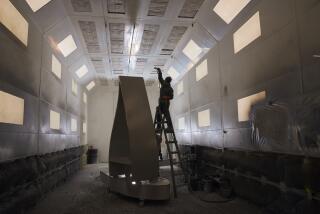In rural Mississippi, dreams of a green car fleet
Reporting from Tunica County, Miss. — Here in this Mississippi Delta county, they are waiting for the return of the slender man in the elegant suit -- the one who spoke, in a heavy Chinese accent, of a promise that couldn’t have been more welcome or fashionable.
It was the promise of a new green industry, with hundreds of green jobs.
“I heard about it,” said Claude Boyd, a 41-year-old farmhand out of work after the winter harvest. “I need it bad. I’ve got good references.”
Joey Lowery, 42 and also unemployed, sounded a skeptical note. “They done had a bunch of things that’s been supposed to come in,” he said. “You hear about it, then after several months you don’t hear anything again.”
His name is Xiaolin “Charles” Wang, a 43-year-old native of Hunan, China, and CEO of the fledgling GreenTech Automotive Inc. He hopes to build a billion-dollar hybrid and electric auto plant here on 1,500 acres of pancake-flat delta farmland, in what was once one of the most depressed settings in the rural South.
Wang made his big announcement at a couple of splashy events in October. A throng of press and Mississippi big shots watched him perform a ceremonial groundbreaking and unveil his electric and hybrid prototypes.
“Three years from today,” he told them, “the land will grow green cars instead of cotton and soybeans.”
He hasn’t made another public appearance here since. So people wait, mindful that the area needs something new, especially now that the last great promise for Tunica -- a 1990s-era embrace of casinos -- appears to be losing steam.
The casinos remain the biggest game in town. Today there are nine of them, with 6,500 hotel rooms, rising out of the old cotton fields like anomalous colonies from the planet Vegas.
The first one, a riverside endeavor called Splash, opened in 1992 and almost immediately drew crowds who waited 3 1/2 hours to enter. “That one casino opening changed the outlook of this economically depressed rural area for the next 16 years,” said Webster Franklin, president of the convention and visitors bureau.
Before the casinos, Tunica was an almost perfectly freeze-dried relic of the Old South. Robert Johnson, the great blues guitarist, grew up on a plantation here.
For decades after slavery, cotton was king, misery the norm. In the 1980s, according to a Mississippi State University report, unemployment was around 20%. In 1987, the Rev. Jesse Jackson toured the shanties of Tunica, and dubbed the place “America’s Ethiopia.”
The casinos brought what local boosters call “the Tunica Miracle.” By 2000, the average yearly unemployment rate had plummeted to 5.4%. The jobs -- desk clerk, waitress, maintenance man -- didn’t make anyone rich, but they were better than what preceded them.
The county budget swelled from $3.5 million in 1992 to more than $56 million in 2008.
On a recent weekday, Lyn C. Arnold, president of the county economic development foundation, drove the flat, freshly paved four-lane roads cutting across the farmland, showing off what that gambling money has bought: the siding on former shanties, the glass and steel airport, the new health and wellness center, a golf and tennis facility.
“There’s pre-gaming and post-gaming,” Franklin said. “That’s the demarcation line. . . . Everything you look at here, if it doesn’t look like it’s been here for 100 years, it’s been here 15.”
But Americans’ fondness for gambling has dimmed in the Great Recession. Casino spending in Mississippi was down 5.9% in 2008, according to the American Gaming Assn.
Franklin remembers the days he could put an insert in the Oklahoma City paper and have dozens of Sooners in the visitors center that weekend. Not anymore.
The casinos started shedding jobs by attrition, then with layoffs, dropping from 14,500 employees at their peak to about 12,500 today, Franklin said. Unemployment, which has always fluctuated here because of seasonal farm work, nonetheless shocked when it went to 19.5% here last January. In November it was at 12.1%.
That is why residents were so happy to see Charles Wang when he and an entourage of executives arrived Oct. 6. GreenTech’s spartan website features a photo of a man in a suit reaching his arms out to a blue sky. “Today’s Challenges/Tomorrow’s Automobile,” it promises, in a clean Helvetica typeface.
The groundbreaking was held on a huge industrial-zoned parcel, in front of a large field stone that read “GreenTech Automotive Industrial Park.”
At Harrah’s casino, Wang presided over the unveiling of the four lustrous prototypes, which included a pure electric vehicle that would go 80 miles on a three-hour charge, and a cherry-red sports car.
Peter Thomas, a reporter at the Tunica Times, remembers it as a dazzling affair, like something out of Hollywood. He also noted to Arnold, of the county foundation, that the company had not bought the land it was breaking ground on. She acknowledged that was the case.
Today, Arnold said, Wang is probably busy trying to raise money for his venture. That’s difficult for anyone these days, but Wang faces particular hurdles. One is the company’s upstart status in a market full of legacy brands.
Another is whether sufficient demand exists in the U.S. for more green cars: In late 2008, Toyota Motor Corp. suspended plans to build its popular Prius hybrid at a new plant based in Blue Springs, Miss., due to the stagnant economy.
Wang, through a spokesman, did not respond to requests for an interview. But Arnold said she was more intrigued than worried about the company’s chances.
“Think about this,” she said. “A few years ago we didn’t know who Hyundai was, and who Kia was.”
At the site of the groundbreaking, the GreenTech plaque has been removed from the field stone. Arnold said it may come out of storage when Mr. Wang comes back.






